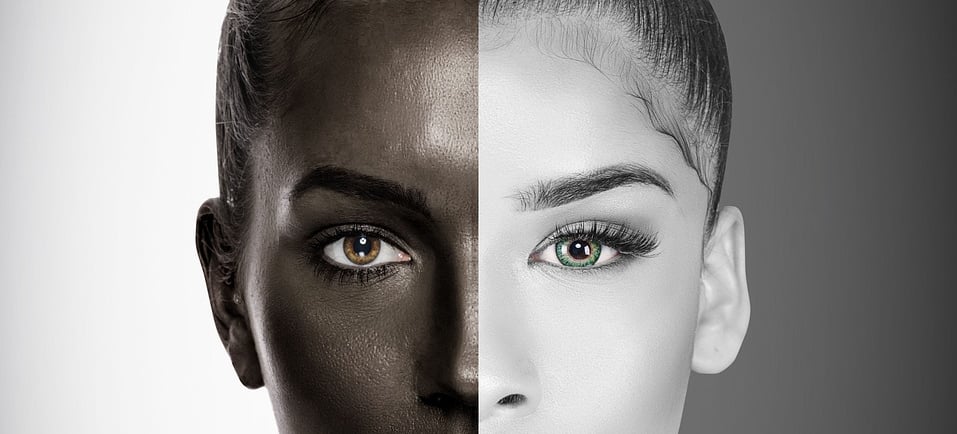Hydroquinone: The Controversial Skin Lightener
Hydroquinone is a very potent skin lightener. It has been used in skin lightening for a long time.. learn more on hydroquinone for skin lightening , hydroquinone and dark skin
SKINCARE INGREDIENTS


Hydroquinone a potent and effective skin lightener. It is one of those skincare ingredients that over time have garnered scrutiny from healthcare professionals to normal people in social media. Most of this scrutiny arises from misuse and misguided consumption of the ingredient. The skin-lightening properties of hydroquinone make it particularly useful in treating various pigmentation disorders. Conditions such as hyperpigmentation, melasma, Post-Inflammatory-Hyperpigmentation(PIH), sun spots and age spots can be addressed with hydroquinone-containing products. Despite its controversies it is still the most go to skincare ingredient for people who want to lighten their skin color especially in countries where there is less education on skin health, certain cultural trends and less or no regulation on hydroquinone-containing skincare products.
Understanding Hydroquinone: What It Is and How It Works
Hydroquinone is a powerful bleaching agent commonly used in dermatology for its efficacy in lightening skin. Chemically, it is a phenolic compound (specifically, 1,4-benzenediol), which acts directly on the skin's pigmentation process. Hydroquinone is primarily known for its ability to inhibit the enzyme tyrosinase, which plays a critical role in the synthesis of melanin— the pigment responsible for skin color. By blocking this enzyme, hydroquinone effectively reduces melanin production, leading to a lighter complexion over time.
Hydroquinone is available in several formulation forms, including creams, lotions, and gels. These products are typically applied topically, directly targeting affected areas of the skin. Depending on the formulation and concentration, hydroquinone products may be available over the counter(OTC) or through prescription. The over-the-counter(OTC) formulation can be 2% or less while prescription formulation form is 4% and provided only by a dermatologist after skin diagnosis.
It is important for users to follow guidelines for safe application and to consult with healthcare professionals to determine the most appropriate treatment regimen, as excessive use can lead to skin irritation or other side effects.
Benefits of Hydroquinone in Skincare
Hydroquinone is recognized for its potent capacity to address a range of skin conditions, making it a valuable asset in dermatological treatments. One of its primary applications is in the treatment of
hyperpigmentation
melasma
post-inflammatory hyperpigmentation
age spots and
improve skin discoloration
By inhibiting melanin production within the skin, hydroquinone effectively lightens these darkened areas, promoting a more even skin tone and restoring overall radiance.
One significant advantage of hydroquinone over other skin lightening agents is its fast-acting nature. Many users report visible results in as little as a few weeks, a feature that distinguishes it from alternatives such as vitamin C, licorice extract or kojic acid, which may take 12 weeks to 6 months to show notable effects depending on the formulation and potency of the skincare product in question. This rapid action has made hydroquinone a preferred choice for those seeking prompt solutions for uneven pigmentation.
Overall, the advantages of using hydroquinone, particularly in relation to its efficacy and rapid results, showcase its role as a leading option in skin care for hyperpigmentation. With proper usage and guidance, hydroquinone remains an effective tool for those seeking to achieve a brighter and more uniform complexion.
Risks and Side Effects Associated with Hydroquinone
Hydroquinone, a popular skin lightening agent, has been utilized for its effectiveness in treating hyperpigmentation and other skin disorders. However, its application is not without risks and side effects, necessitating careful consideration and guidance from medical professionals. One of the primary concerns associated with hydroquinone use is the possibility of allergic reactions. These reactions may manifest as redness, swelling, or itching in the area where hydroquinone is applied, indicating the skin's adverse response to the compound.
skin irritation remains another noteworthy side effect reported by users of hydroquinone. Individuals with sensitive skin are particularly susceptible, which may lead to further complications.
skin dryness
facial swelling
skin rashes
stinging sensations, and
skin peeling, prompting the need for cessation of product use to mitigate discomfort and prevent further harm
As a precaution, patch testing is recommended prior to starting hydroquinone to assess individual skin tolerance. This process allows users to identify any potential allergic reactions or irritations, providing essential insight before embarking on a more extensive treatment plan.
A rare but severe condition associated with hydroquinone is exogenous ochronosis, characterized by a bluish-black discoloration of the skin, primarily affecting individuals who use hydroquinone for an extended period. Although it is uncommon, the risk increases with prolonged exposure. Studies have been conducted to show that it could be more dangerous to people of color especially African skin.
Safety Concerns and Precautionary Measures for Hydroquinone
The use of hydroquinone as a skin lightener has raised significant safety concerns, particularly regarding its regulation and availability across different countries. Hydroquinone is available over-the-counter in some regions while being restricted or banned in others due to potential health risks. For instance, the European Union has classified hydroquinone as a hazardous substance because of its potential links to serious side effects, such as skin irritation and other dermatological issues. Countries like the United States allow its use in specific concentrations, making it vital for consumers to understand the regulations governing hydroquinone products in their locality.
When utilizing hydroquinone, it is essential to adhere to recommended usage guidelines strictly. Users should not exceed the advised concentration or duration of treatment to mitigate risks of adverse skin reactions. Furthermore, limiting sun exposure is paramount; hydroquinone may increase skin sensitivity to UV radiation, leading to a higher risk of sunburn or pigmentation changes. Thus, employing a broad-spectrum sunscreen with adequate 50+ SPF becomes a vital precautionary step for anyone incorporating hydroquinone into their skincare routine.
Consumers should also be vigilant when selecting products, ensuring that they read the labels carefully. Look for reputable brands that explicitly state the concentration of hydroquinone such as Tri-Luma and include any necessary warnings. Recognizing signs of adverse reactions such as redness, itching, or swelling is crucial, and individuals should discontinue use immediately if such symptoms arise.
Consulting healthcare professionals before starting any hydroquinone regimen is highly advisable, as a dermatologist can provide personalized recommendations based on skin type and sensitivity, thus ensuring a safer application of this powerful skin lightener.
Final Thoughts on Hydroquinone for Skin Lightening
Hydroquinone has long been a topic of debate in the realm of skin lightening. Its effectiveness in treating hyperpigmentation and improving skin tone has made it a popular choice for many individuals seeking a brighter complexion. However, the potential side effects and controversies surrounding its use necessitate a careful approach.
Despite its advantages, hydroquinone should not be used indiscriminately. Long-term use can lead to a condition known as exogenous ochronosis, which causes blue-black pigmentation on the skin. Consequently, it is advisable to use hydroquinone only under the guidance of a qualified healthcare professional who can assess its suitability based on individual skin types and conditions. Limiting the usage period and monitoring for any adverse effects can enhance the safety of its application.
For those hesitant to use hydroquinone, several alternative treatments and natural remedies may be considered. Ingredients such as
vitamin C
kojic acid
licorice extract and
azelaic acid
Ultimately, the decision to use hydroquinone for skin lightening should be informed and carefully considered especially for darker skin individuals. Consulting with a dermatologist can help individuals navigate their choices, ensuring they receive tailored advice that respects their unique skin concerns. This informed approach will empower individuals to make the best decisions for their skincare regimen.
